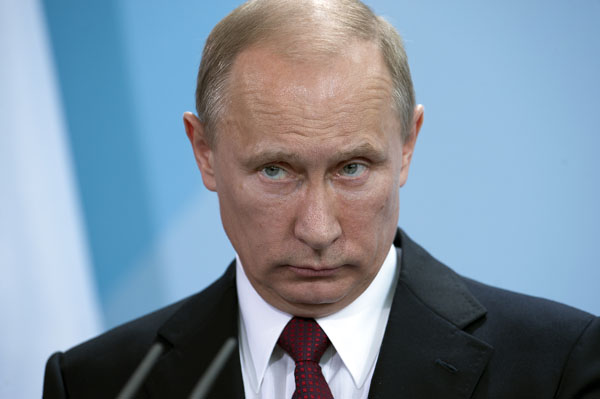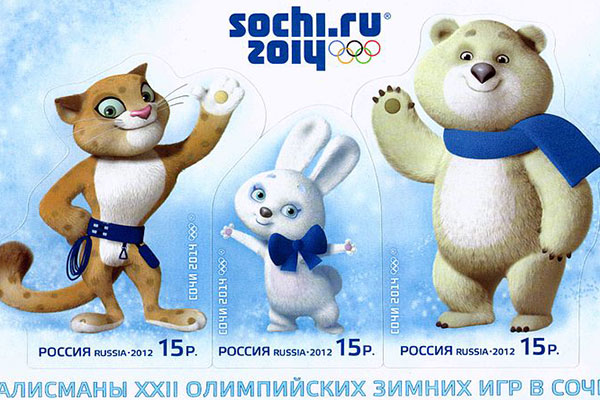8 Nov 2013 | News and features, Russia

The United Nations got together yesterday to adopt a resolution calling for a world truce during the Winter Olympics kicking off in Sochi, Russia in exactly three months. This has become a tradition over the past 20 years — a symbolic gesture in the months leading up to the games. For the first time, however, it called upon the host country to “promote social inclusion without discrimination of any kind.”
Obviously a thinly veiled reference to the overtly anti-LGBT legislation Russia passed back in June. The vaguely worded ban on “gay propaganda” aimed at minors has sparked outrage across the world, with some activists calling for a boycott of the games.
But have no fear — Sochi Games chief Dmitry Chernyshenko, present at the UN, reminded us all that President Putin has repeated “three times” that there will be “no discrimination”.
THREE TIMES, YOU GUYS.
While you will forgive me for reserving my judgment on that particular guarantee for now, it is worth noting what was not mentioned in the resolution and what we were not given any assurance about. The right to freedom expression — or rather lack thereof — stands at the core of this issue. Since the law came into power, LGBT protesters have been attacked and arrested. Authorities have warned that spectators and athletes can be fined for “gay propaganda”, like displaying rainbow flags.
I don’t know about you, but to me that seems to fly in the face of the the universal human right to freedom of expression and assembly. But maybe it was simply an oversight, and this is next on the agenda. In which case, I’ve got a few suggestions on where to start.
For one, there are currently 28 Greenpeace activists and two journalists under arrest in Russia. They were staging a peaceful protest by a Gazprom oil rig on September 18, when their ship was boarded by Russian security forces. They are currently detained in a prison in St Petersburg. Initially held on piracy charges with a potential 15 year sentence, they have now been downgraded to hooliganism. This could still mean up to seven year in jail. Again, that’s for a peaceful protest.
Then there’s the case of the TV crew from the Norway’s Olympic broadcaster TV2. While filming a recent report in Sochi, they were taken into custody, interrogated, harassed and denied contact with the Norwegian embassy. The journalists were also told that they were now ‘blacklisted’. Not very encouraging to hear if you’re a critical foreign reporter heading to Sochi in February, never mind a member Russia’s perpetually repressed independent press.
And of course, you can’t talk about freedom of expression in Russia without mentioning Pussy Riot. Two members of the feminist punk group have been in prison since February 2012. The latest news was the apparent disappearance of Nadezhda Tolokonnikova as she was moved between prisons. This came after the Guardian published an open letter where she detailed the horrible conditions they were being held under. It soon emerged that she might be, like in some sort of Soviet nightmare, sent to Siberia.
One of the fundamental principles of the Olympics deals with “preserving human dignity”, and there is no doubt that freedom of expression is a pretty big part of that. Rather than listening to Putin’s empty promises, we should be measuring up Russia’s commitment to “human dignity” where it counts.
This article was originally posted on 7 Nov 2013 at PolicyMic.com
1 Aug 2013 | News and features, Pacific Standard, Russia

Russian lawmaker Vitaly Milonov has suggested that every gay athlete and spectator who comes to Russia for the 2014 Games will be arrested. (The International Olympic Committee says that won’t happen.) And while it is not totally clear what the “gay propaganda” law specifically means, Global Post has a useful summary:
Reports of arrest for kissing or hold hands, wearing or using rainbows, or pro-gay activism have helped to clarify the definition of “propaganda” as “any statement, oral or otherwise, that is pro-gay.”
It is now illegal to even admit homosexuality in public. It is also illegal to equate the value of homosexual relationships with that of heterosexual relationships, and punishment does not apply solely to Russians.
Foreigners can be arrested and detained for up to 15 days, fined and deported.
So, basically, anything remotely gay, and you’re in prison. With that in mind, I suggest, to Milonov and the rest of Russia, that every sport be banned from the 2014 Winter Games.
Alpine skiing? The competitors wear rainbow-colored spandex, which is often associated with “gay” in popular culture.
Biathlon? Men. Holding guns. Discharging them into the air. Textbook phallic symbolism.
Bobsled? Four men in spandex, stuffed inside a penis-shaped capsule. You could also argue that women doing the same—being inside of the penis capsule, which is an anti-traditional-sex position—is just as evocative of disruption.
Cross-country skiing? See alpine skiing.
Curling? Women eschew traditional feminine attire for pants and polo shirts. Men crash large stones into large stones strategically placed by other men.
Figure skating? “I can say that the best figure-skating in the world is the Soviet school of figure skating,” said Milonov. I have no response.
Freestyle skiing? Women with sticks strapped to their feet stomp over moguls, which evoke breasts, and thus suggests a rejection of classical femininity.
Ice hockey? Wood-en sticks are used to slap a hard and cold object past a desexualized being covered in padding and shielded by a mask.
Luge? Men in spandex, laying backwards, in direct contrast with the traditional male posture of dominance. Women, erect and sliding through a giant tube, subverting the basic male-to-female sex act.
Nordic combined? One gay sport plus another gay sport equals a really gay sport.
Short track speed skating? Often results in members of the same sex piled on top of each other while wearing extremely tight clothing, and is therefore not too dissimilar from a public orgy.
Skeleton? The name itself is a rejection of the appearance and the living human characteristics which are the basis of traditional patriarchal society. That, therefore, is an inherently gay attitude.
Ski jumping? Both male and female posit themselves as human phallic symbols, hurtling through the air. That evocation of equality is gay.
Snowboarding? The sport was founded as a counter-cultural activity, which is gay.
Speed skating? Hooded spandex outfits obscure any suggestion of gender across all competitions, thus creating a space for any/all close readings of sexuality, which would not be the case in a climate where “gay” is considered illegal.
In short, ban the 2014 Winter Olympics from Russia.
This article originally appeared at Pacific Standard. Pacific Standard is an arm of the nonprofit Miller-McCune Center for Research, Media and Public Policy.
10 Aug 2012 | Uncategorized
Index on Censorship has not exactly been shy in its criticism of the control-freakish atmosphere of the Olympics. Nor have we held back criticisms of the misuse and abuse of the UK’s Public Order Act.
So you would have thought that the story of Mark Worsfold, allegedly arrested for looking a bit glum at the Olympic cycling road race would have been something we would have jumped on. Mr Worsfold, a martial arts instructor, has difficulty moving his facial muscles due to Parkinson’s disease.
But there seemed something not quite right about the national papers’ reporting of the whole thing — partly down to Worsfold’s own apparent hesitance to criticise the police — the local paper reported that despite his five hours in custody, Mr Worsfold was keen to see the “funny side” of the incident.
Over at Harry’s Place, blogger amie has an interesting take on what happened, claimed to be based on a chance meeting with Mark Worsfold’s brother at the Olympic Park in London. Amie says the following is Worsfold’s brother’s account of the arrest:
Mark had served in Northern Ireland and appreciates full well the stresses involved in assessing responses in tense situations. He was concerned that the newspaper reports (It was in the Guardian as well) were reflecting this as a case of police brutality which, if the full background were known, it would be apparent it was not.
The group of protesters near where he was standing were from Fathers 4 Justice [groan from my Family Law lecturer sister sitting alongside me]. To make matters worse, a woman protester next to him trying to join the other demonstrators and who was haranguing the police as imperialist lackeys, etc, looked as if she was with him.
“This is all going to kick off” he thought, and he needed to get to his daughter’s birthday. With that he jumped off the wall to leave. Bad move, worse timing, open to misinterpretation. When he was jumped on, he tried to say he had been to a Taekwondo demonstration and needed to get to his daughter. What the police heard, in the presumably noisy environment, (said the brother), was “demonstration” and “getting to his daughter” — a reasonable impression of a Father 4 justice with access issues.
He would be grateful if I could convey to others a more rounded perspective.
This version of events certainly doesn’t mean Mr Worsfold isn’t owed an apology, or that our Public Order Act is not misused ridiculously and sometimes disturbingly. But it’s useful, nevertheless, to put reporting of the exercise of Public Order powers in context.
31 Jul 2012 | News and features, United Kingdom
 Chilling free speech in the name of brands, rights and commercialisation is not what promoting the Olympic spirit is about, says Kirsty Hughes
Chilling free speech in the name of brands, rights and commercialisation is not what promoting the Olympic spirit is about, says Kirsty Hughes
This piece was originally published on Huffington Post UK
Friday’s opening of the Olympic Games, with the extraordinary spectacle created by Danny Boyle, ranging from the industrial revolution to the digital age, from children’s literature to the National Health Service, has received plaudits and praise along with some bemusement and criticism. It may be just as well though that it didn’t celebrate another British icon, the BBC.
The impact of the commercialisation of the Games, with lucrative sponsorship and rights deals, means another British virtue — freedom of speech — is rather less free than normal for the duration of London 2012. A particularly disturbing example of this is the BBC — which has said that due to rights restrictions various radio programmes, ranging from the prestigious Radio 4 Today news programme to the lighter Radio 2 Chris Evans’ Breakfast Show and Radio 5 Live, whether live or on iPlayer, may not be available to audiences abroad for the duration of the Games.
While the BBC World Service has a proud history of broadcasting into authoritarian regimes, faced with its lucrative rights deal for UK broadcasting of the Games, the BBC is blocking its own output from being available internationally. It has a helpfully succinct explanation of this on its own news site where it says: “The BBC’s agreement with the International Olympic Committee means we are not allowed to broadcast anything online outside the UK from the Olympic Park or Olympic venues. As a result this programme may need to be blanked for International listeners due to rights issues surrounding Olympic content in programmes.”
Perhaps conscious of quite how ludicrous this is, and damaging to the BBC’s own image and values, by Sunday the BBC had apparently carried out some damage-limitation negotiations with the International Olympic Committee so at least the Today programme could be restored to international listeners — though the announcement of this appears to be confined to a small blog update which states:
After discussion, the IOC and the BBC have agreed that there is no need to block our international streams of Radio 4 programmes with a wide news agenda. Radio 5 Live (apart from the news programme Up All Night) and 5 Live Olympics Extra will remain available only in the UK.
We knew that the Olympic commercial brands deals had put money ahead of free speech — Locog published months ago two lists of words that must not be combined at risk of legal action for breaching the brand/copyright rules. These include not combining the words “games”, “2012” or “twenty twelve” with, for example, “gold”, “silver” “medals”, “sponsor” or “summer”. But more examples keep coming in of the censorship effects, and the chilling of the right to peaceful protest.
Unauthorised YouTube videos of the Games are reportedly being taken down with alacrity. Meanwhile, a group of cyclists has been banned from cycling in Newham for the duration of the Games.
The Olympic charter celebrates a number of human rights, declaring that: “The practice of sport is a human right… Any form of discrimination with regard to a country or a person on grounds of race, religion, politics, gender or otherwise is incompatible with belonging to the Olympic Movement.” The charter makes no commitment to that other key and universal human right — freedom of expression. But chilling and censoring free speech in the name of brands, rights and general commercialisation is surely not quite what promoting the Olympic spirit is all about.
Kirsty Hughes is Chief Executive of Index on Censorship
 MORE ON LOCOG’S OLYMPIC CENSORSHIP AT INDEX’S FREE SPEECH BLOG
MORE ON LOCOG’S OLYMPIC CENSORSHIP AT INDEX’S FREE SPEECH BLOG
PLUS NATALIE HAYNES GETS TO GRIPS WITH THE RULES POLICING THE BRAND OF THE LONDON GAMES HERE
AND READ MORE ON SPORT AND HUMAN RIGHTS IN INDEX ON CENSORSHIP MAGAZINE’S SPORTS ISSUE




